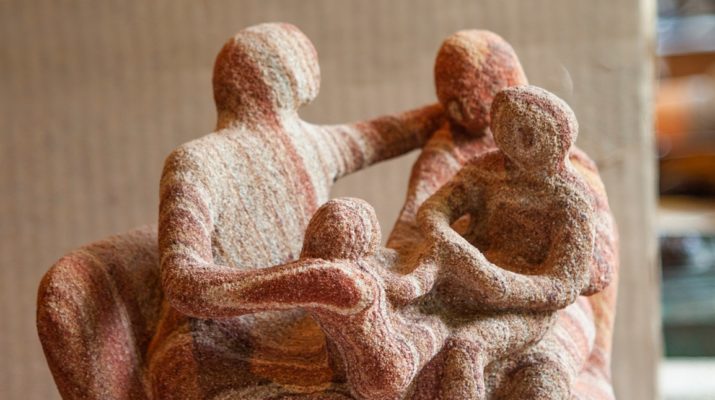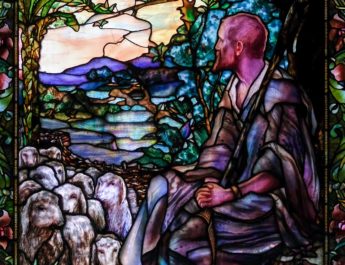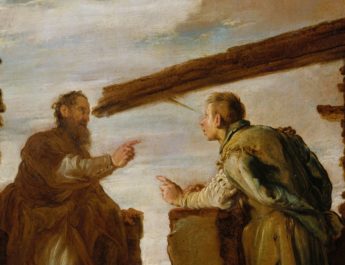Romans 8:14-17, 22-27
Pentecost C28
Pentecost – A Women’s Lectionary
14 For all who are ledA by the SpiritB of GodC are childrenD of God.
A “led” = ago. This is lead, bring, carry, guide, drive, go.
B “Spirit” = Pneuma. From pneo (to blow, breathe, breathe hard). This is wind, breath, or ghost. A breeze or a blast or air, a breath. Figuratively used for a spirit, the human soul or part of us that is rational. It is also used supernaturally for angels, demons, God, and the Holy Spirit. This is where pneumonia comes from.
C “God” = Theos. From Proto-Indo-European origins, meaning do, put, place. This is God or a god in general.
D “children” = huios. This is son, descendant – a son whether natural born or adopted. It can be used figuratively for other forms of kinship.
15 For you did not receiveE a spirit of slaveryF to fall back into fear,G but you received a spirit of adoption.H
E “receive” = lambano. It does not refer to passive receiving of something, but active acceptance or taking of something whether it is offered or simply nearby. It focuses on individual decision and action.
F “slavery” = douleia. 5x in NT. From douleo (to be a slave, be in bondage, to serve, obey, be devoted; it is to be a slave in a literal or figurative sense); from doulos (a servant or for a slave, enslaved; someone who belongs to someone else; could be voluntary (choosing to be enslaved to pay off debt) or involuntary (captured in war and enslaved)); from deo (to tie, bind, fasten, impel, compel; to declare something against the law or prohibited). This is slavery, bondage, or enslavement in a literal or figurative sense.
G “fear” = phobos. From phebomai (to flee, withdraw, be put to flight). This is panic flight, fear, fear being caused, terror, alarm, that which causes fear, reverence, respect.
H “adoption” = huiothesia. Related to “children” in v14. 5x in NT. From huios (see note D above) + tithemi (to put, place, set, fix, establish in a literal or figurative sense; properly, this is placing something in a passive or horizontal position). This is making a son, adoption.
When we cry,I “Abba!J Father!”K
I “cry” = krazo. This is to cry out, scream, shriek. It is onomatopoeia for the sound of a raven’s call. Figuratively, this means crying out urgently without intelligible words to express something that is deeply felt.
J “Abba” = Abba. 3x in NT. From Aramaic ab (father); corresponding to Hebrew ab (father in a literal or figurative sense – grandfather, chief, ancestor). This is abba, which means father – not a diminutive daddy.
K “father” = pater. This is father in a literal or figurative sense. Could be elder, senior, ancestor, originator, or patriarch.
16 it is that very Spirit bearing witness withL our spirit that we are childrenM of God, 17 and if children,N then heirs:O
L “bearing witness with” = summartureo. 3x in NT. From sun (with, together with) + martureo (to bear witness, testify, give evidence; to testify in a literal or figurative sense); {from martus (a witness whether having heard or seen something; witness literally, judicially, or figuratively; by analogy, a martyr)}. This is to testify together with. It can also mean to corroborate.
M “children” = teknon. From tikto (to beget, bring forth, produce). This is a child, descendant, or inhabitant.
N “children” = teknon. Same as “children” in v16. See note M above.
O “heirs” = kleronomos. 15x in NT. From kleros (lot, portion, heritage; that share assigned to you; also a lot used to determine something by fate, chance, or divine will); {perhaps from klero (casting a lot) or from klao (to break in pieces as one breaks bread)} + the same as nomos (what is assigned – usage, law, custom, principle; used for the law in general or of God’s law; sometimes used to refer to the first five books of the Bible or the entire Old Testament; also used to refer to theology or the practice and tradition of interpreting and implementing the law of God); {from nemo (to parcel out, assign)}}. This is heir, inheritor, or possessor – whether literal of figurative.
heirsP of God and joint heirs withQ Christ,R if we in fact suffer withS him so that we may also be glorified withT him.
P {untranslated} = men. This is truly, indeed, even, in fact. Often, it is not translated, but used to emphasize affirmation.
Q “joint heirs with” = sugkleronomos. Related to “heirs” in v17. 4x in NT. From sun (with, together with) + kleronomos (see note O above). This is a joint heir, participant, or co-inheritor.
R “Christ” = Christos. From chrio (consecrate by anointing with oil; often done for prophets, priests, or kings). Literally, the anointed one, Christ. The Greek word for Messiah.
S “suffer with” = sumpascho. 2x in NT. From sun (with, together with) + pascho (to be acted on for good or ill; often used for negative treatment; properly, feeling strong emotions – especially suffering; can also be the ability to feel suffering). This is to suffer with or sympathize – it is shared pain or can be used specifically to refer to persecution.
T “be glorified with” = sundoxazo. 1x in NT. From sun (with, together with) + doxazo (to render or hold something as glorious, to glorify, honor, magnify, or celebrate; ascribing weight to something by recognizing its true value or essence); {from doxa (glory, opinion, praise, honor, renown; particularly used as a quality of God or manifestation of God – splendor); from dokeo (to have an opinion, seem, appear, suppose; a personal judgment; to think); from dokos (opinion)}. This is glorified together, shared approval, exalting in joint dignity.
22 We knowU that the wholeV creationW has been groaning togetherX as it suffers together the pains of labor,Y
U “know” = eido. This is to know, consider perceive, appreciate, behold, or remember. It means seeing with one’s eyes, but also figuratively, it means perceiving – seeing that becomes understanding. So, by implication, this means knowing or being aware.
V “whole” = pas. This is all or every.
W “creation” = ktisis. 19x in NT. From ktizo (to build, create, form, shape; God’s acts of creation); probably akin to ktaomai (to get, purchase, possess). This is creation, creature, or ordinance. It is also used for when a city is founded and creation as origin.
X “groaning together” = sustenazo. 1x in NT. From sun (with, together with) + stenazo (to groan inwardly, sigh, complain; groaning from the pressure of forward momentum as in childbirth); {from steno (to moan, groan, sigh) OR stenos (narrow, constricted, compressed; hemmed in from obstacles); probably from histemi (to stand, place, set up, establish, stand ready, stand firm, be steadfast)}. This is to moan or groan together – to lament. Figuratively, it is sharing in a tragedy.
Y “pains of labor” = sunodino. 1x in NT. From sun (with, together with) + odino (to have labor pains, be in labor; it is having labor pains from a literal or figurative sense); {from odin (labor pain, intense agony, sorrow, the pain of a new endeavor); akin to odune (pain, distress, grief – physical or mental; anguish); from duno (to enter, sink into; can also be set like the sun)}. This is to suffer together as labor pains.
23 and not onlyZ the creation, but we ourselves, who haveAA the first fruitsBB of the Spirit, groanCC inwardly
Z “only” = monon. From monos (alone, single, remaining, mere, desolate); from meno (to stay, abide, wait, endure). This is merely, only, simply, sole. It can also imply alone.
AA “have” = echo. This is to have, hold, possess.
BB “first fruits” = aparche. 8x in NT. From apo (from, away from) + arche (origin, beginning, rule; can refer to the power of a magistrate or a king; it is the first thing as being the starting point or the most important); {from archomai (to begin or rule); from archo (to rule, begin, have first rank or have political power)}. This is first fruit or gift. It is the beginning of sacrifice – so the first crops of the season. It is also used figuratively of early converts in a specific location.
CC “groan” = stenazo. Related to “groaning” in v22. 6x in NT. See note X above.
while we waitDD for adoption, the redemptionEE of our bodies.FF
DD “wait” = apekdechomai. 8x in NT. From apo (from, away from) + ekdechomai (to take or receive, expect, await; to welcome someone from your heart; focusing on the goal of waiting or the outcome); {from ek (from, from out of) + dechomai (to warmly receive, be ready for what is offered, take, accept, or welcome; to receive in a literal or figurative sense)}. This is eager awaiting or fully expecting something.
EE “redemption” = apolutrosis. 10x in NT. From apo (from, away from) + lutroo (to redeem, liberate, release because ransom was paid in full; figuratively, returning something or someone to their rightful owner) [from lutron (ransom, the money used to free slaves; also a sacrifice of expiation; figurative for atonement); from luo (to loose, release, untie; figuratively, to break, destroy, or annul; releasing what had been withheld)]. This is redemption, deliverance, or release particularly with the notion of ransom paid – a buying back what had been lost.
FF “bodies” = soma. Perhaps from sozo (to save, heal, rescue); from sos (safe, well, rescued). This is body or flesh. It can be body in a literal or figurative sense (as the body of Christ). This is where the word “somatic” comes from.
24 For in hopeGG we were saved.HH Now hope that is seenII is not hope, for who hopes forJJ what one already sees? 25 But if we hope for what we do not see, we wait for it with patience.KK
GG “hope” = elpis. From elpo (to anticipate, welcome, expect; usually to anticipate positively). This is expectation, hope, trust, confidence faith. The expectation can be abstract or concrete.
HH “saved” = sozo. Related to “bodies” in v23. See note FF above.
II “seen” = blepo. This is literally to see – it is primarily used in the physical sense. However, figuratively it can be seeing, which includes attention and so to watchfulness, being observant, perceiving, and acting on the visual information. It can also mean beware.
JJ “hopes for” = elpizo. Related to “hope” in v24. From elpis (see note GG above). This is to expect, trust, hope for, or to wait in an active way.
KK “patience” = hupomone. Related to “only” in v23. From hupo (by, under, about) + meno (see note Z above). This is properly to remain behind or remain under. It implies endurance, patience, steadfastness, and waiting in hope.
26 Likewise the Spirit helpsLL us in our weakness,MM for we do not know how to prayNN as we ought,OO
LL “helps” = sunantilambanomai. Related to “receive” in v15. 2x in NT– here and in the incident with Mary and Martha and Jesus where Martha asks Jesus to tell Mary to help her in Luke 11:40. From sun (with, together with) + antilambano (to take instead of, take hold of, help, support, enjoy; providing or receiving support that directly corresponds to the real need); {from anti (over against, opposite instead of, offsetting) + lambano (see note E above)}. This word is to take hold with at the side, lend a hand along with, cooperate with, take one’s share in, help, aid. Give assistance with full initiative because closely identified. Supplying help that exactly corresponds to the need. Personal interest motivating giving the help.
MM “weakness” = astheneia. From asthenes (without strength, sick, deprivation; weak in a moral or physical sense); {from a (not) + sthenes (strong, vigor); {from the base of sthenoo (to strengthen so that one can be mobile); from sthenos (strength)}}. This is weakness, frailty, illness, suffering, or calamity. It is any kind of sickness or injury that includes weakness or diminishes your ability to enjoy or accomplish what you would choose.
NN “pray” = proseuchomai. From pros (advantageous for, at, toward) + euchomai (to wish, make a request, pray). This is to pray or pray for, to worship or supplicate. It is more literally exchanging one’s own wishes for God’s.
OO “ought” = dei. Related to “slavery” in v15. From deo (see note F above). This is what is necessary or proper. It is what is needed or what one should do – a duty or something inevitable. This refers to something absolutely necessary.
but that very Spirit intercedesPP with groaningsQQ too deep for words.RR
PP “intercedes” = huperentugchano. 1x in NT. From huper (by, under, over, above, under the authority of another) + entugchano (to encounter, appeal, please, chance upon, confer with, to meet someone in order to consult with them); {from en (in, on, at, by, with, among) + tugchano (root means to become ready; to hit, meet, happen, obtain, chance, perhaps; properly, to hit the mark or be spot on; the opposite of the Greek word for sin hamartano, which literally means to miss the mark); {perhaps from tucho (to make ready, bring about)}}. Properly, to happen upon someone – to bend forward in order to make petition for or intercede – to grant benefit.
QQ “groanings” = stenagmos. Related to “groaning” in v22 & “groan” in v23. 2x in NT. From stenazo (see note X above). This is groaning or sighing, particularly because of a situation that is bringing a lot of pressure.
RR “too deep for words” = alaletos. 1x in NT. From a (not, without) + laleo (to talk, say, preach); {from lalos (talkative)}}. This is inexpressible, unspeakable. It is something “that baffles words” or is too profound to be expressed.
27 And God, who searchesSS hearts,TT knows what is the mindUU of the Spirit, because the Spirit intercedesVV for the saintsWW according to the will of God.
SS “searches” = ereunao. 6x in NT. From eraunao (to search or examine); perhaps from ereo (to say, tell, speak, mean, command); perhaps from rheo (to say, speak of, command). This is to seek or examine. Figuratively, it can mean to investigate or desire to know.
TT “hearts” = kardia. Literally the heart, but figuratively mind, character, inner self, will, intention, thoughts, feelings. Also, the center of something. The word heart is only used figuratively in the Old and New Testaments. This is where “cardiac” comes from.
UU “mind” = phronema. 4x in NT. From phroneo (to think, judge, use one’s mind, have an opinion, shape one’s opinion through action); from phren (diaphragm, heart, intellect, understanding; figurative for personal opinion or inner mindset; thought regulating action; sympathy, feelings, cognition); perhaps from phrao (to rein in or curb). This is thought, purpose, mindset, inner perspective. It can also mean acting on gut insight.
VV “intercedes” = entugchano. Related to “intercedes” in v26. 5x in NT. See note PP above.
WW “saints” = hagios. From hagnos (holy, sacred, pure ethically, ritually, or ceremonially; prepared for worship, chaste, unadulterated, pure to the core; undefiled by sin; figurative for innocent, modest, perfect). God is totally different from humanity and thus set apart. That which is consecrated to worship God (elements of worship) or to serve God (as the saints) are holy because they are now set apart for God’s purposes. Holy because important to God. This is sacred physically, pure. It can be morally blameless or ceremonially consecrated.
Image credit: “Sandstone Family” by Will Salisbury. Photo by Richard Margolis, 2019.




